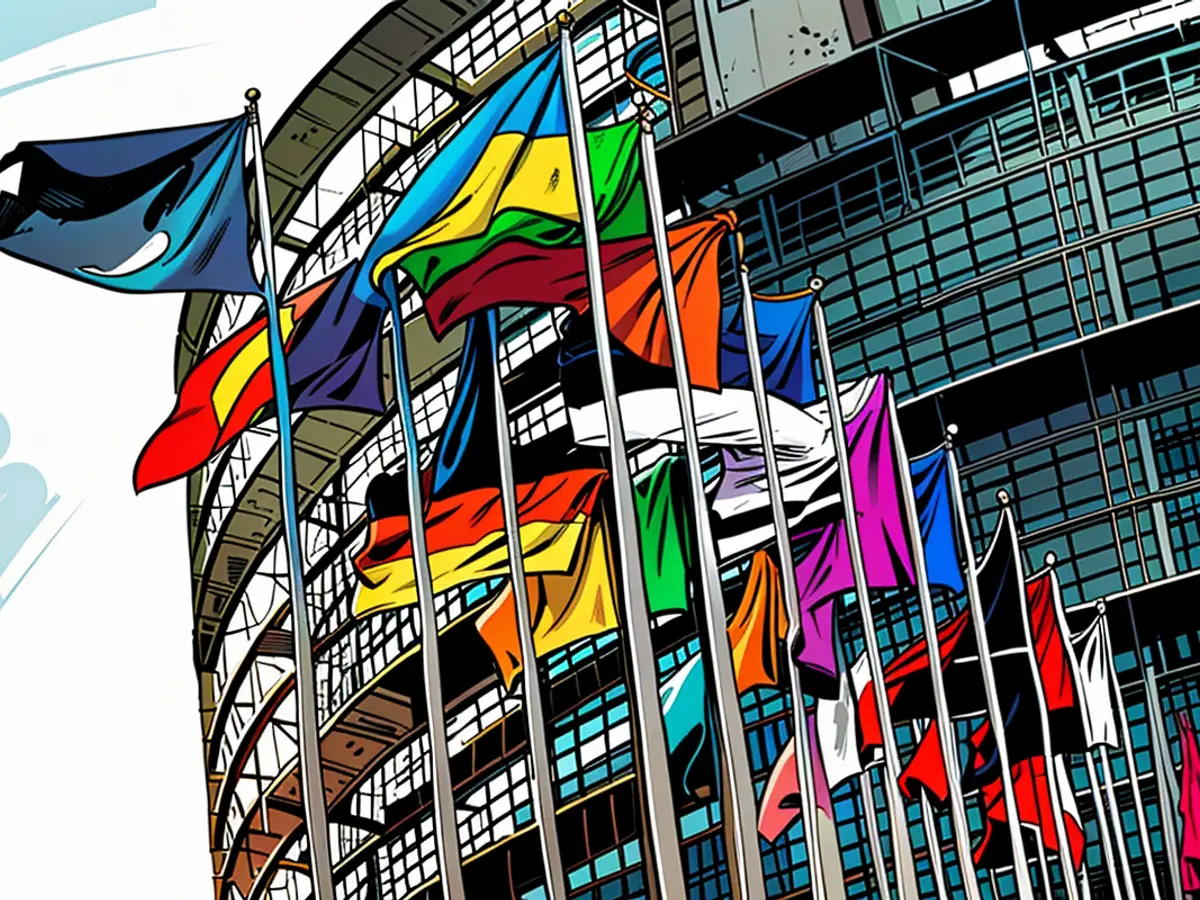The European Parliament - Upcoming European elections foresee a triumph for the Alliance in Germany.
In Germany and many other EU nations, citizens will elect the new European Parliament today. With around 360 million people eligible to vote, Germany has about 65 million citizens participating in the election. Voting began on Thursday, when the Dutch voted.
There are 720 seats to be filled, with 96 of them coming from Germany. The European election is the largest democratic vote globally and the only one across national borders. Over 1,400 candidates ran for office in Germany for 35 parties and other political groups.
Polls predict that the Union party is frontrunner in Germany, while many right-wing parties are expected to falter in countries like Austria, France, and Italy. In Germany, the CDU and CSU are expected to win the European election with a considerable margin. The SPD, Greens, and AfD follow closely behind.
The first prediction of the seat distribution in the new European Parliament will be revealed on Sunday around 8:15-8:30 PM. The first preliminary results from some EU countries are expected after 11:00 PM.
Across several German states, local elections were also held on Sunday, with decisions regarding municipal, city, and district assemblies at stake in Baden-Württemberg, Brandenburg, Hamburg, Mecklenburg-Vorpommern, Rhineland-Palatinate, Saarland, Saxony, and Saxony-Anhalt.
In Thuringia, where local elections took place two weeks ago, voters could also elect their future district presidents or mayors. In 15 districts and free cities, runoff elections will take place, with nine instances including AfD candidates. The party won several seats in local parliaments in the first round of the local elections yet failed to make inroads into town halls and district offices.
The performances of the parties in Brandenburg and Saxony are also of interest, as these local elections act as a barometer for the state elections in September.
Saturday saw the end of the European election campaign in Germany with rallies, protests, and calls to vote. German Chancellor Olaf Scholz expounded on his Ukraine policy at the SPD's election campaign finale in Duisburg, confirming there would be no NATO soldiers in the country. Meanwhile, France is considering sending military trainers to Ukraine.
On the day before the election, people demonstrated in numerous cities against right-wing extremism and for democracy. A coalition of civil society organizations had called for this, with protests occurring in Berlin, Hamburg, Munich, Cologne, and Dresden. According to police estimates, approximately 15,000 people had gathered in Berlin. Slogans included "Heart over hate," "Human rights instead of right-wing haters," and "Diversity without alternatives."
The campaign faced attacks on politicians until the last minute. In Dresden, an AfD politician was assaulted Saturday. Denmark's Prime Minister Mette Frederiksen canceled previously scheduled appointments after a physical assault Friday night.
Former CDU leader Friedrich Merz urged his supporters in his weekly email to support the party, campaigning for incumbent EU Commission President Ursula von der Leyen (CDU). With the highest esteem worldwide, the 65-year-old CDU woman is vying for a second term as EU Commission President. As Commission President, she oversees around 32,000 employees who propose new EU laws and monitor treaty observance. She regularly represents the EU at major international summits, such as G7 or G20.
Read also:
- Despite predictions of a strong performance, the AfD is facing challenges in the Parliamentary election in Germany.
- The SPD and Greens are closely following the Union party in the EU elections, aiming to secure significant seats in the German segment of the European Parliament.
- The Netherlands was the first EU nation to start the European elections this year, setting the stage for other countries to follow.
- Across Europe, right-wing parties like the AfD in Germany and the Lega in Italy are expected to underperform in the European elections.
- The upcoming Sunday will see the first announcement of seat distribution predictions in the EU Parliament, marking a key milestone in the election process.
- While Germany is focusing on EU elections, local elections are also being held in several states, including Hamburg and Brandenburg, impacting municipal, city, and district assemblies.
- The performance of the CDU and CSU in Brandenburg and Saxony's local elections is being closely watched, as it can indicate the outcome of the state elections in September.
- In response to calls from civil society organizations, protesters across Europe, such as in Austria and France, demonstrated against right-wing extremism and for the preservation of democracy ahead of the elections.
- Following his expulsion from the CDU, former party leader Friedrich Merz still plays a role in the upcoming EU elections, campaigning for Ursula von der Leyen's second term as EU Commission President.
- The European elections are taking place amidst intense debate on Ukraine's policy, with Germany's Chancellor Olaf Scholz continuing to affirm that there will be no NATO soldiers in the country, while France considers sending military trainers.
- As the largest democratic vote globally, the European elections offer an opportunity for countries like India and Ukraine to participate in shaping and contributing to European laws and policies.








